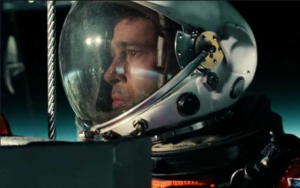AD ASTRA: 4 STARS. “A father and son twist on ‘Heart of Darkness.’”
 “Ad Astra,” a new space opera starring Brad Pitt, is not simply a journey into the universe but a trek into the star’s ability to keep the story earthbound while reaching for the stars.
“Ad Astra,” a new space opera starring Brad Pitt, is not simply a journey into the universe but a trek into the star’s ability to keep the story earthbound while reaching for the stars.
Set in the very near future, “a time of hope and conflict,” “Ad Astra” stars Pitt as astronaut Maj. Roy McBride. His father, Clifford McBride (Tommy Lee Jones), went missing three decades before while travelling space, looking for alien life.
The younger McBride’s latest mission is his most important ever, both personally and professionally. Something or someone is sending deadly anti-matter surges toward the earth and NASA thinks they may be coming from McBride Sr’s lost spaceship. They send the stoic Roy, armed with a nuclear device, on a top-secret mission to Neptune to find out what’s going on.
As the stoic Roy hurtles through space his path his fraught with risk. But the most dangerous part of the trip isn’t battling moon bandits or intergalactic monkeys, it’s the journey into his own psyche.
A father and son twist on “Heart of Darkness,” “Ad Astra” is cerebral, humanist sci fi. It is more akin to films like “2001: A Space Odyssey” and Andrei Tarkovsky’s “Solaris” than the big budget space operas that tend to top the box office. It’s a solemn, meditative look at masculinity, isolation and emotional stoicism.
Pitt gives an understated but effective performance that relies on the subtlest of movements. McBride’s outward fortitude masks a tumultuous inner life, ripe with questions and muddled feelings. His training has taught him to stay even keeled—his pulse never raises above 80 even in the most stressful situations—but as he comes closer to Neptune and the possibility of being reunited with his father, cracks begin to appear in his carefully crafted facade. Pitt, in a largely non-verbal performance save for copious voiceover, shows his emotions through the cracks, allowing the character to reveal himself in the contemplative but compellingly unsettling way.
“Ad Astra”—which means “through hardships to the stars” in Latin—has all the hallmarks of a blockbuster, there’s a big star, beautifully shot action sequences by “Interstellar” cinematographer Hoyte Van Hoytema and the kind of end-of-the-world scenario the Avengers love, but it’s a heady one. It’s more concerned with what’s going on inside McBride’s head as what’s happening outside. Also, like so many blockbusters, it doesn’t know what to do with the female characters. Liv Tyler is glimpsed only through a screen and Ruth Negga, while always wonderful, is essentially an exposition machine. Still, the character study is spellbinding enough, thanks to Pitt’s performance, to maintain interest.
